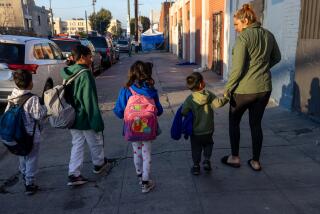A cash opportunity for some of NYC’s poorest families
NEW YORK — Mayor Michael R. Bloomberg unveiled a novel $50-million program Thursday to pay New York families cash for taking steps to lift themselves out of poverty by keeping their children in school, staying healthy and earning more.
Under the privately funded two-year pilot program, called Opportunity NYC, 2,500 families will earn rewards of $50 to $300 for meeting goals such as attending a parent-teacher conference, visiting the dentist or getting job training.
Families would get paid every two months and could receive $3,000 to $5,000 each a year, city officials said.
“We’ll offer cash to families as a way of encouraging parents and young people to take positive actions: to stay in school, to stay healthy, and increase their earnings -- all key ways to rise out of poverty,” Bloomberg said at a news conference in Brooklyn’s Brownsville neighborhood. He added, “No city or state in America has ever invested in a conditional cash transfer program.”
Rebecca M. Blank, dean of the Gerald R. Ford School of Public Policy at the University of Michigan, praised the approach.
“We have not, in this country, done serious testing of these sorts of incentive programs,” she said. “I’m delighted to see New York City is trying it.”
Bloomberg said that if the program proved successful he would seek government support. Of the $50 million cost, $42 million already has been raised, he said.
The Rockefeller Foundation is one of the key sponsors, he said.
Other donors include the Starr Foundation, the Robin Hood Foundation, the Open Society Institute and American International Group.
Bloomberg, a billionaire businessman, said he also contributed personally.
The city will begin enlisting volunteer families in September.
To qualify, a family’s annual earnings must not exceed 130% of the federal poverty level. For instance, a single parent with two children could earn no more than $20,000 annually to qualify, said Linda Gibbs, deputy mayor for health and human services.
The city will seek a total of 5,000 families because half will serve as a control group -- and won’t receive cash incentives -- in order to gauge the effect of the program, officials said.
Gibbs said a similar conditional cash transfer program in Mexico now known as Oportunidades showed an increase in school enrollment and attendance, among other things.
In Chicago, the nonprofit Project Match has created an incentive program based on points, which allows individuals to earn rewards such as DVD players and health club memberships.
When asked why people should be paid for doing things society believes they ought to do anyway, Bloomberg said, “It is true you should take care of yourself.”
Still, he said: “It’s pretty ridiculous to argue that everybody is doing that. If this works, shame on us if we’re not willing to try it.”
More to Read
Sign up for Essential California
The most important California stories and recommendations in your inbox every morning.
You may occasionally receive promotional content from the Los Angeles Times.










